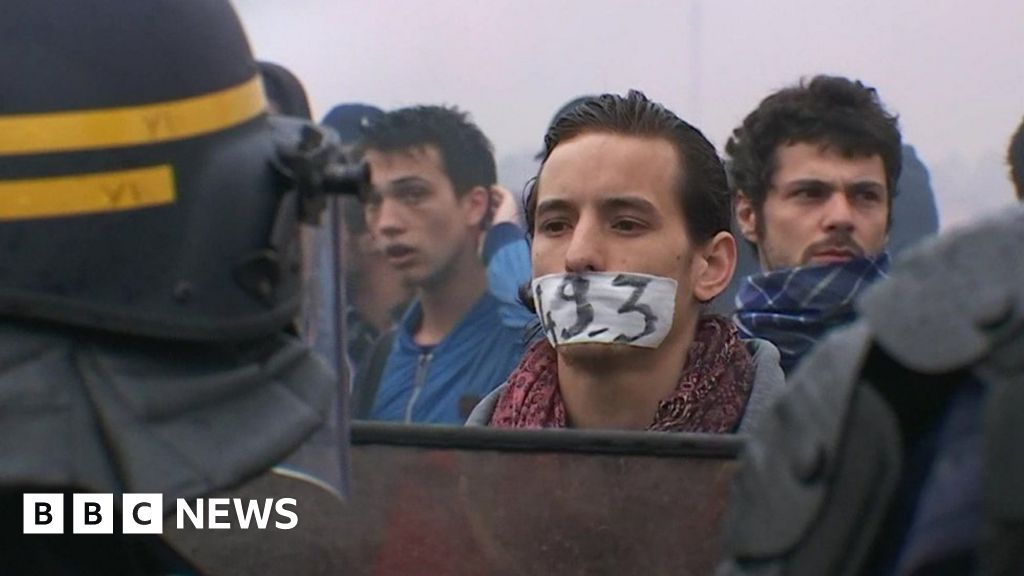
French Govt Slammed for Pesticide Phase-Out Delay
French govt slammed for putting pesticide phase out on hold – French Govt Slammed for Pesticide Phase-Out Delay: The French government’s recent decision to put a halt to its planned pesticide phase-out has sparked outrage and ignited a firestorm of criticism. Environmental groups and agricultural stakeholders are united in their condemnation, arguing that this move jeopardizes public health and the environment.
The decision has triggered a heated debate, with many questioning the government’s commitment to sustainability and raising concerns about the long-term consequences for both people and the planet.
The French government’s rationale for the delay rests on concerns about potential economic impacts on the agricultural sector and potential shortages of essential food products. However, critics argue that these concerns are outweighed by the urgent need to protect human health and biodiversity.
The debate highlights the complex challenges of balancing economic interests with environmental and public health concerns, particularly when it comes to the use of potentially harmful chemicals.
The French Government’s Decision

The French government’s decision to put the pesticide phase-out on hold has sparked controversy and raised concerns among environmental groups and citizens alike. This decision, announced in early 2023, marked a significant setback for the country’s ambitious plan to reduce pesticide use and protect biodiversity.
Reasons for the Decision
The government’s decision to halt the phase-out was primarily driven by concerns regarding the potential impact on agricultural production and food security. The government argued that the proposed ban on certain pesticides, particularly neonicotinoids, could lead to crop losses and higher food prices.
Additionally, the government cited the need for further scientific research to assess the long-term effects of these pesticides on the environment and human health.
Pesticides Involved in the Phase-Out
The pesticides targeted for phase-out included a range of chemicals, with a particular focus on neonicotinoids. These insecticides, known for their neurotoxic effects on insects, have been linked to declines in bee populations and other pollinators. The government’s decision to put the phase-out on hold raised concerns about the potential for these harmful pesticides to continue being used in agriculture, further jeopardizing biodiversity and ecosystem health.
Rationale Behind the Decision
The government’s decision to put the pesticide phase-out on hold was met with criticism from environmental groups and scientists who argued that the move would undermine efforts to protect biodiversity and human health. They pointed out that the scientific evidence supporting the harmful effects of neonicotinoids is substantial and that the government’s decision to prioritize short-term economic concerns over long-term environmental and health risks is unacceptable.
The government’s decision has also been criticized for its lack of transparency and consultation with stakeholders, including farmers, environmental groups, and scientists.
Reactions and Criticisms

The French government’s decision to put the pesticide phase-out on hold has been met with mixed reactions and widespread criticism. Environmental groups expressed deep disappointment and concern, while agricultural stakeholders offered a more nuanced perspective.
The French government’s decision to put the pesticide phase-out on hold has been met with widespread criticism. It’s a stark contrast to the positive news coming from the tech world, where Meta and Amazon have both exceeded expectations with their recent financial reports.
While these companies are celebrating success, the French government’s inaction on environmental issues sends a worrying message about its commitment to a sustainable future.
Environmental Groups’ Concerns
Environmental groups have voiced strong opposition to the government’s decision, citing its potential negative impact on human health and the environment.
- The French branch of Greenpeace, for instance, condemned the decision as a “betrayal” of the government’s commitment to environmental protection. They argued that the phase-out was crucial for reducing pesticide use and its associated risks.
- The environmental advocacy group, Friends of the Earth France, echoed these sentiments, calling the decision “a step backward” and urging the government to reconsider its stance. They emphasized the urgent need to address the harmful effects of pesticides on biodiversity and human health.
- Other environmental organizations have expressed similar concerns, highlighting the potential long-term consequences of delaying the pesticide phase-out. They argue that the government’s decision undermines efforts to achieve the objectives of the European Green Deal, which aims to transition to a sustainable and climate-neutral economy.
Agricultural Stakeholders’ Perspective
While environmental groups have expressed strong opposition, agricultural stakeholders have presented a more nuanced view. While acknowledging the need to reduce pesticide use, they have highlighted the challenges and concerns associated with a rapid phase-out.
- The French Farmers’ Union (FNSEA) expressed concerns about the potential economic impact on farmers, particularly those reliant on certain pesticides for crop protection. They emphasized the need for a gradual transition and adequate support for farmers during the phase-out process.
It’s disheartening to see the French government backpedal on its pesticide phase-out, prioritizing short-term economic interests over the long-term health of its citizens and the environment. Meanwhile, across the globe, the situation in Gaza continues to escalate, with Hamas leader Ismail Haniyeh heading to Cairo for truce talks.
The talks aim to bring an end to the conflict , but the urgency of finding a peaceful solution is starkly contrasted by the French government’s inaction on a crucial environmental issue. It’s a reminder that we must address both immediate crises and long-term challenges with equal commitment.
- The French Federation of Agricultural Cooperatives (FNSEA) also expressed concerns about the availability of alternative solutions to pesticides. They argued that further research and development are necessary to ensure effective and affordable alternatives are available to farmers.
Criticism of the Government’s Decision
Critics have leveled a number of criticisms against the French government’s decision. They argue that the decision:
- Undermines the government’s commitment to environmental protection and sustainable development.
- Disregards the scientific evidence linking pesticide use to health and environmental risks.
- Fails to adequately consider the needs of farmers and the agricultural sector.
- Sets a dangerous precedent for other countries considering similar phase-out plans.
Comparison of Perspectives
The perspectives of environmental groups and agricultural stakeholders differ significantly on the issue of pesticide phase-out. While environmental groups prioritize the health and environmental risks associated with pesticide use, agricultural stakeholders emphasize the economic and practical challenges faced by farmers.
The government’s decision to put the phase-out on hold appears to have prioritized the concerns of agricultural stakeholders over those of environmental groups.
The Impact on Health and Environment
The French government’s decision to delay the phasing out of pesticides raises serious concerns about the potential consequences for public health and the environment. Continued use of these chemicals poses significant risks to human health, biodiversity, and ecosystems.
Health Risks Associated with Pesticide Use
Pesticide residues can contaminate food and water, leading to exposure through ingestion, inhalation, and skin contact. This exposure can result in a range of health problems, including:
- Acute poisoning:Immediate symptoms such as nausea, vomiting, dizziness, and respiratory problems. In severe cases, pesticide poisoning can lead to coma or death.
- Chronic health effects:Long-term exposure to pesticides can increase the risk of developing cancer, birth defects, reproductive problems, neurodevelopmental disorders, and endocrine disruption.
- Impact on vulnerable populations:Children, pregnant women, and people with pre-existing health conditions are particularly vulnerable to the effects of pesticides.
Environmental Impact of Pesticides
Pesticides can have devastating effects on biodiversity and ecosystems, leading to:
- Loss of pollinators:Pesticides can kill bees, butterflies, and other pollinators, which are essential for food production and ecosystem stability.
- Contamination of water sources:Runoff from agricultural fields can carry pesticides into rivers, lakes, and groundwater, harming aquatic life and contaminating drinking water.
- Soil degradation:Pesticides can kill beneficial soil organisms, leading to reduced soil fertility and increased erosion.
- Resistance:Over time, pests can develop resistance to pesticides, making them less effective and requiring the use of more toxic chemicals.
Specific Health and Environmental Effects of Targeted Pesticides, French govt slammed for putting pesticide phase out on hold
| Pesticide | Health Effects | Environmental Effects |
|---|---|---|
| Glyphosate | Linked to cancer, endocrine disruption, and birth defects. | Kills beneficial soil organisms, contaminates water sources, and harms pollinators. |
| Neonicotinoids | Neurotoxic, can affect brain development and behavior. | Highly toxic to bees and other pollinators, leading to colony collapse disorder. |
| Organophosphates | Can cause acute poisoning, long-term neurological damage, and birth defects. | Toxic to aquatic life, birds, and other wildlife. |
The Future of Pesticide Regulation
The French government’s decision to put the pesticide phase-out on hold has significant implications for the future of pesticide regulation in France. This decision has sparked debate about the balance between agricultural productivity, environmental protection, and public health. This decision has raised concerns about the commitment to sustainable agriculture and the potential consequences for the environment and human health.
Challenges and Opportunities for Sustainable Agriculture
The decision to postpone the pesticide phase-out presents both challenges and opportunities for the implementation of sustainable agricultural practices in France.
- Challenges:The delay in the pesticide phase-out could discourage investment in research and development of alternative, sustainable farming methods. It could also lead to continued reliance on conventional pesticides, potentially exacerbating environmental and health concerns. Additionally, the government needs to provide adequate support and incentives to farmers transitioning to sustainable practices.
- Opportunities:The delay could provide a window for further research and development of innovative, sustainable agricultural technologies. It could also serve as a catalyst for increased public awareness and demand for pesticide-free products. Furthermore, this delay could allow for more effective planning and implementation of sustainable agricultural policies, ensuring a smoother transition for farmers.
A Potential Timeline for Pesticide Phase-Out
While the government’s decision to delay the pesticide phase-out has set back the timeline, a phased approach remains crucial for achieving a sustainable agricultural future. A potential timeline could include:
- Short-term (2-3 years):Focus on intensifying research and development of alternative pest control methods, including biological control, integrated pest management (IPM), and precision agriculture techniques. Implement pilot projects to demonstrate the effectiveness of these methods and encourage farmer adoption. Enhance public awareness campaigns on the benefits of sustainable agriculture and the risks associated with pesticide use.
- Medium-term (5-7 years):Implement stricter regulations on pesticide use, including limits on specific types of pesticides and mandatory adoption of IPM practices. Introduce incentives and financial support for farmers transitioning to sustainable practices. Develop a comprehensive monitoring system to assess the effectiveness of the regulations and the impact on the environment and public health.
- Long-term (10+ years):Gradually phase out the use of the most hazardous pesticides, focusing on those with the highest environmental and health risks. Continue to invest in research and development of sustainable agricultural technologies. Implement a comprehensive system for the certification and labeling of pesticide-free products, promoting consumer choice and demand for sustainable agriculture.
The French government’s decision to put the pesticide phase-out on hold is a major setback for environmental health. It’s a reminder that even when we see positive developments, like the second century for Williamson as New Zealand extend their lead past 500 in the cricket match, we need to stay vigilant and push for progress on crucial issues like pesticide reduction.
It’s clear that we can’t afford to lose momentum on environmental protection, especially when the consequences are so significant.
Global Implications
The French government’s decision to put the pesticide phase-out on hold has significant implications for global efforts to reduce pesticide use. This decision sends a mixed message to the international community, particularly at a time when many countries are striving to implement stricter pesticide regulations.
Comparison with Other Countries
The French government’s approach to pesticide regulation stands in contrast to the policies of several other countries. For example, the European Union has implemented a comprehensive strategy to reduce pesticide use, including targets for reducing pesticide use and promoting sustainable agricultural practices.
The United States has also taken steps to address pesticide concerns, with the Environmental Protection Agency (EPA) regularly reviewing and regulating pesticide use.
- European Union:The EU has set ambitious targets for reducing pesticide use by 50% by 2030. The EU’s approach emphasizes the adoption of integrated pest management (IPM) techniques, which focus on preventing pests rather than relying solely on chemical control.
- United States:The EPA regulates pesticide use in the US, including setting limits on pesticide residues in food and water. The EPA also promotes IPM practices and encourages the development of less harmful pesticides.
- China:China has implemented a national strategy to reduce pesticide use, focusing on promoting IPM and sustainable agriculture practices.
Global Landscape of Pesticide Regulations
The global landscape of pesticide regulations is complex and diverse, with varying levels of stringency and enforcement across countries. This complexity is reflected in the following visual representation: Global Landscape of Pesticide Regulations[Visual representation not provided. The visual representation would show a world map with different regions colored according to their level of pesticide regulation stringency.
Regions with stricter regulations would be represented by darker shades, while regions with less stringent regulations would be represented by lighter shades. The map could also include icons to represent specific pesticide regulations or policies, such as bans on certain pesticides, requirements for IPM, or targets for reducing pesticide use.]
Last Word: French Govt Slammed For Putting Pesticide Phase Out On Hold

The French government’s decision to put the pesticide phase-out on hold is a significant setback for environmental advocates and a cause for serious concern. The decision has triggered a national and international outcry, raising critical questions about the future of pesticide regulation and the commitment to sustainable agriculture.
It remains to be seen whether the government will reconsider its stance and whether this decision will have a ripple effect on other countries grappling with similar challenges. The debate surrounding this decision is likely to continue, as the stakes are high and the consequences for public health and the environment are far-reaching.






